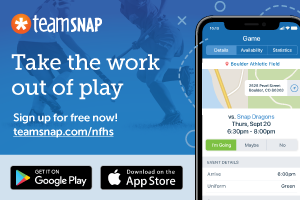Dartmouth Introduces Robots to Eliminate Live Tackling in Practice
By Steffen Parker on October 26, 2017 hst PrintIn 2011, the Dartmouth football team’s coaches decided to eliminate tackling other team members from their practices in response to their concern about concussions and the effects they have on their players both during their sports careers and their lives afterwards. Concerns about concussion have reached all levels of play, but if players cannot tackle each other during practice, what can they do to properly prepare for their next game?
That was the question Dartmouth’s head coach proposed to some of his current and former players who were students in the college’s Thayer School of Engineering in 2013. Was there a technological solution to providing football players with a safe way to practice tackling and blocking? Their idea was to build a fast, mobile tackling dummy that could move as a football player and be knocked down by a powerful linebacker and then bounce back up, ready to be tackled again. By reducing the contact between players, the hope was to reduce the head injuries that occurred during practice while still allowing game-like situations. However, the idea was the easy part as the team of engineers, including several football players, soon discovered.
The first prototype, introduced for the 2015 season, was remotely controlled by a coach, rolled along on a central ball and could move along at football player speed, cutting, weaving and turning on a dime. After some experimentation with using sensors and software to right it, a weighted bottom was added to the tall padded body which allowed the tackling robot to take a hit from a player and bounce right back upright (much like the Weeble toy).
As various issues surfaced with the unit, the design team reconfigured components and made changes in the different parts of the robot. Some of those changes included increasing the overall weight to make it a better opponent, more secure connections so that repeated tackles did not affect the performance, different drivetrain settings so that it could maneuver on various field surfaces like artificial turf, grass, dirt, etc., and run-flat wheels so that it would keep running.
As each successive robot became more durable and more useful, the word was spreading about Dartmouth’s discovery and the success of its tackling robots. Following the 2011 change in practice tackling, Dartmouth’s football team has seen a 50 percent drop in missed tackles, a winning record each year, an Ivy League Championship, all while keeping players healthier, fresher and playing longer. Other teams started to notice and ask about the tackling robots as well. Two of the original team members, one a former defensive lineman, continued development of the tackling robot, improving the controls, the drivetrain and its overall capabilities.
A partnership with a national sports equipment company allowed six beta units to be produced and brought to several NFL and college 2016 spring training camps. And with each demonstration, more was learned about how to make the robot perform better under all conditions: cold, heat, mud, rain and all the rest that every football player confronts in practice every day.
Now being used by 10 NFL teams and more than 20 colleges, the MVP (Mobile Virtual Player) is faster, more agile, more durable and more like a real football player. The remote control is easier to learn and use, and
allows the operator-coach to better simulate a real opponent on the practice field. The hope is that future models will be programmable to run routes and move autonomously as well as work together with other robots on the field, thus freeing the coach to do more coaching. Work continues to keep the cost of the MVP down so that high school programs can afford them as well, continuing their efforts to reduce the number and severity of concussions among their players.
Steffen Parker
Steffen Parker has worked with computers since the mid-70s and has been a Macintosh user since its introduction in 1984. Serving as an IT support person for the Vermont Principals’ Association and the Information Support Specialist for Vermont’s Lamoille North Supervisory Union, Parker supports computer use for adults working in education, administration, finance and publication including the NFHS High School Today Publications Committee where he also serves as the Performing Arts representative.
Most Recent Articles
- nfhs news NFHS Learning Center Unveils School Honor Roll Program
- NFHS Network Contact Information
- nfhs news Shout-out to Health-Care Workers and State High School Associations
- state news Stadiums Across Colorado Light Up to Show Support for Students
- gymnastics-girls article ‘They became a family’: How New Castle gymnastics qualified for state for first time since 2002



